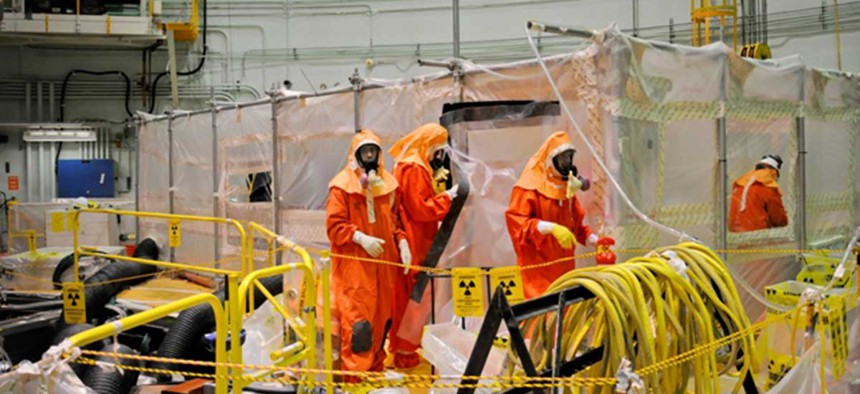
Employees work on the Experimental Breeder Reactor-II facility in Idaho. Energy Department file photo
The Obama Administration is Working on Its Next Nuclear Deal
The White House wants to alter a plutonium-disposal pact. What will Russia demand in return?
Fresh off last year’s deal to limit Iran’s nuclear development, the Obama administration is mulling another nuclear deal — this one with Russia. Washington wants to change course on a plan laid with Moscow 16 years ago to dispose of its share of 68 metric tons of plutonium.
“Clearly, we do have some diplomatic work to be done in this area,” Rose Gottemoeller, undersecretary of State for arms control and international security, said Tuesday at a Defense Writers Group breakfast in Washington.
In 2000, Washington and Moscow agreed to dispose of nuclear weapons waste through a process that mixes waste plutonium with uranium oxide. This creates mixed oxide fuel pellets, known as MOX, which can be burned in commercial nuclear power plants. The transformation of America’s 34 metric tons of plutonium to MOX was supposed to happen at the Savannah River Site, a multibillion-dollar facility in South Carolina. But after 16 years and $4 billion, the plant is only about 70 percent complete. (Russia is burning its own plutonium in a fast reactor.)
So in 2013, the White House began to look at alternatives. Last month, as part of its 2017 budget proposal, the Energy Department announced it would “pursue a dilute and dispose approach as a faster, less expensive path to meeting the U.S. commitment to dispose of excess weapons grade plutonium.” This would involve storing the diluted plutonium in New Mexico.
Some have cheered this search for alternatives to the expensive MOX plant. Others say that too much has already been spent to simply walk away. These include Sen. Lindsey Graham, R-S.C., whose state stands to get jobs and revenue from the plant.
Still others point out the foreign-policy aspects to changing course. “The Russians have long opposed burying the plutonium because it doesn’t really destroy the material, as burning the MOX in a reactor does—it can be retrieved and reused for nuclear weapons purposes,” former Sen. Richard Lugar, R-Ind., wrote in Politico last year. “Given current tensions with Russia, any renegotiation of the plutonium agreement could require us to make costly or damaging concessions.”
Frank Klotz, head of the National Nuclear Security Administration, the arm of the Energy Department that oversees the MOX project, said at a March 16 Senate appropriations energy and water subcommittee hearing that once the U.S. government decides on a new plutonium disposal plan, it would be presented to the Russians. That did not sit well with Graham.
“That is absolutely the dumbest frickin' plan I could think of: to change course and hope the Russians would agree and not know what they’re going to charge you for it,” Graham said.
Pentagon leaders have spent the past year labeling Russia as America’s top threat, in the wake of Moscow’s invasion of Ukraine and more recent support of Syria’s Bashar al-Assad.
But even with Washington-Moscow relations at an ebb, Gottemoeller said the two superpowers still cooperate on projects to eliminate weapons of mass destruction, citing Russia’s role in Iran deal and another pact to remove chemical weapons from Syria.
“I think … we do seem to be able to develop good cooperation in areas that are related to weapons of mass destruction,” she said. “I would think that this [plutonium disposal] matter could be one where we could have some good, solid cooperation, but I don’t want to talk further about diplomatic efforts.”







